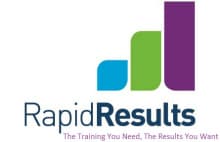Blog by Carolyn Burnet
[dt_gap height=”10″ /]Rapid Results often receive calls saying that a company requires training but they don’t know what they want. These calls sometimes emerge after a survey has been conducted asking for input from their staff. Apparently the “more training” box is ticked but no detail as to the type of training. In other cases it is because Management is aware that staff are now doing the basics very well and it is time to develop them.
[dt_gap height=”10″ /]As a training company we have a huge resource of courses, workshops and activities that we can suggest. However we are not the important part of the exercise – the Company needing the training is. I could take advantage of the situation and suggest a variety of courses but that would be unethical unless I was very sure that there would be return on investment for our client.
[dt_gap height=”10″ /]Our aim is to give companies the training they need and deliver the results they want. We therefore need to understand more about the company before suggesting any programme. Ideally companies would like their staff to cooperate harmoniously as a team, be able to manage their time efficiently and productively, be resourceful and show initiative as they work to meet performance expectations. However, Management may be too immersed in the business to take the time to step back and look at how they are actually operating at the various levels.
[dt_gap height=”10″ /]There are a range of questions that can be discussed which may start to uncover the training that is needed:
- [dt_gap height=”10″ /]What is your business vision or current objective? This is the first question to ask. Where do you see your business next year, or in five years? Have you planned a strategy to achieve the vision? Is there a change coming up to meet the vision that you need to have buy-in from your team?
- [dt_gap height=”10″ /]How embedded are your company values? Have your teams had the opportunity to discuss and take personally your values? Do they know what they are? How can they behave as you would like if they don’t know what you stand for. For example, are your sales team meeting their targets by selling a product or service that isn’t fit for purpose – but do so believing that “no one will know”? Do they care enough about your brand and good name to do what is right by every customer?
- [dt_gap height=”10″ /]What skills would your ideal Manager / Team Leader / CSR have? If we could pick the perfect person for each position- what would they be able to do, and how would they do it? Try and define the competencies that you need in your team. These should link back to your vision and values. Now look at your present team and identify the competency gaps.
- [dt_gap height=”10″ /]How engaged / productive / motivated are your team members? This is an important area to investigate at all levels – Front Line, Team Leaders, Operations Managers and Management. Engaged staff need to understand and believe in the vision of their company, be motivated by those they report to, be confident that they will be listened to, and believe that what Management say – they will do.
- [dt_gap height=”10″ /]What has happened that you are thinking about training? While we may be called in response to an in-house survey, we are more often contacted after a problem has arisen that has forced an issue to be addressed. The training needed in this instance is obvious.
- [dt_gap height=”10″ /]Are you receiving complaints from your customers? While we should all be grateful to the people who take the time to tell us they are unhappy, when do we recognise that we have a bigger problem? Are the complaints about our products or service – perhaps we have over-promised. Or are they about the customer service they received? Identify why customers are complaining
- [dt_gap height=”10″ /]How well do your teams work together? Your teams may be comprised of individuals who do their job well but in isolation from each other, or a team who combine together to do their best as a single entity.
- [dt_gap height=”10″ /]How do these issues impact on your business / customers /profitability? Do complaints, disengaged staff, absenteeism, poor time management, uncooperative teams result in a loss of profitability or high staff turnover? Can you quantify what it is costing your Company?
- [dt_gap height=”10″ /]What issues would be resolved by taking action? While change is challenging, the resulting improvements outweigh the effort. Positive changes can be measured in dollars. For example, if staff are not happy coming to work there is often a rise in absenteeism or sick leave. For a staff of 20, this may result in 100 sick days per year. If each staff member received $150 per day then 100 sick days would cost $15000 per annum. If taking action reduced absenteeism by 50% the ROI is clearly quantified.
[dt_gap height=”10″ /]If you are considering staff training, then please make contact on 09 447 1994 or email at carolyn@rapidresults.co.nz. We would be delighted to discuss your desired outcomes, or talk through some of the above questions to uncover your needs.

Recent Comments